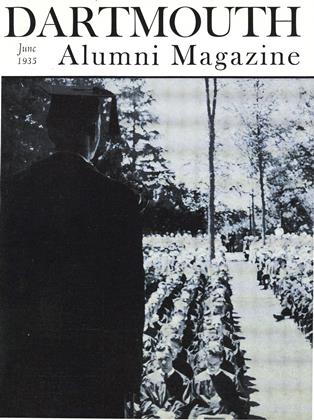Suppose we give you a few excerpts from these editorials and see if you recognize "the college on the hill":
"As it is at present, Dartmouth is notsucceeding in making its men useful to society, but chiefly in being acceptable in'society.'"
". . . . it is no evolving a new educational theory to cope with the exigency of hundreds of thousands of students whoswarm into our college each September (our italics) with no other objective in mind than to make the best fraternity or to win a letter."
"Too many members of the social sciencedepartments carry open-mindedness to absurdity."
"In a period as epoch-making as this one appears to be, it is time that professors rose to the statute of the times." .... (that one about the N. R. A.?) .... "It is time that they grasped the power that is rightfully theirs and broke down the walls of student indifference with ideas that are challenging, provocative, and their own."
"But the administration of the privateliberal arts college lacks either the honesty or the cynicism of their faculty Since both students and teachers in theprivate schools are usually anti-social,usually selfish, usually interested in education as an end in itself—the administratorsare merely doing lip-service to a fine butunfortunately nebulous ideal."
"As the head of a large private financial enterprise, the college administrator's first concern can be neither educational nor social, but instead for the small group whose money enables the college to prosper."
"Throughout the country the alumnibodies have often proved more of a detriment to American education than an asset.It is no empty stereotype that has picturedthem as contributors to the volume of thecollege cheers, rather than to the culturalactivity and educational advancement oftheir alma maters."
We are not going to apologize for giving so much space to quotations. Our job is to picture Dartmouth as the undergraduates see it, and here in a nutshell is the view of one group, a group that unfortunately has the College's only effective publicity organ at its disposal for the propagation of its ideas.
The Editor might reply to all this that he wasn't thinking just of Dartmouth, but of the typical liberal college. We might then ask him if he has ever been to another one to make investigations.
He then might say that he purposely used violent language to encourage controversy (as in fact he did in a note at the bottom of a critical Vox Populi letter), but unfortunately a newspaper is responsible for what it prints, aside from all excuses or explanations.
 View Full Issue
View Full Issue
More From This Issue
-
 Sports
SportsFOLLOWING THE BIG GREEN TEAMS
June 1935 By C. E. W. "30 -
 Class Notes
Class NotesClass of 1934
June 1935 By Martin J. Dwyer, Jr -
 Article
ArticleWAS THE PROFESSOR RIGHT?
June 1935 By Eric P. Kelly '06 -
 Class Notes
Class NotesClass of 1932
June 1935 By Charles H. Owsley, II -
 Class Notes
Class NotesClass of 1933
June 1935 By John S. Monagan -
 Article
ArticleHANOVER BROWSING
June 1935 By Herbert F. West '22
W. J. Minsch Jr. '36
-
 Article
ArticleUNDERGRADUATE CHAIR
June 1935 By W. J. Minsch Jr. '36 -
 Article
ArticleSEMI-PUBLIC ORGANIZATION
June 1935 By W. J. Minsch Jr. '36 -
 Article
ArticleMAY TRADITIONS
June 1935 By W. J. Minsch Jr. '36 -
 Article
ArticleWORLD GENIUS AT HANOVER
December 1935 By W. J. Minsch Jr. '36 -
 Article
ArticleCAMPUS BRIEFS
December 1935 By W. J. Minsch Jr. '36 -
 Article
ArticleSNOW ARTISTS
March 1936 By W. J. Minsch Jr. '36
Article
-
 Article
ArticleDr. Randall Recalls
December 1956 -
 Article
ArticleSpotlight
Nov/Dec 2007 -
 Article
ArticleOther Sports
November 1957 By CUFF JORDAN '45 -
 Article
ArticleDan'l Adams, 1797
March 1950 By DAVID E. ADAMS '13 -
 Article
ArticleUNCONQUERED TERRITORY
January, 1931 By Neil E. Disque -
 Article
ArticleThayer School
November 1952 By WILLIAM P. KIMBALL '29


